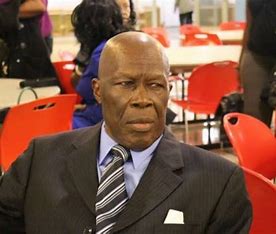phrey NwosuThe Senate on Wednesday rejected a motion to immortalize the late Humphrey Nwosu, the electoral chief who oversaw Nigeria’s historic June 12, 1993, presidential election, reigniting debates over the country’s commitment to its democratic past.
Nwosu, who chaired the now-defunct National Electoral Commission (NEC), conducted what is widely regarded as Nigeria’s freest and fairest election—won by Chief MKO Abiola but annulled by the military regime of General Ibrahim Babangida.
Senator Enyinnaya Abaribe (Abia South) proposed renaming the Independent National Electoral Commission (INEC) after Nwosu as a tribute to his role in shaping Nigeria’s democratic journey. However, when Deputy Senate President Jibrin Barau called for a vote, the motion was overwhelmingly rejected.

Following the rejection, Abaribe sought to revisit the motion through another point of order, but Senate Leader Opeyemi Bamidele shut it down, citing parliamentary rules that prevent reintroducing a motion already decided upon in the same session. Barau upheld this stance, triggering objections from Abaribe and some lawmakers.
“This is not just about one man—it’s about our democratic history,” Abaribe argued. “Denying this motion sends the wrong signal about our commitment to acknowledging the sacrifices that brought us here.”
Former Senate Leader Yahaya Abdullahi warned that blocking such discussions could weaken legislative independence. “If senators are prevented from speaking on critical national issues, we risk eroding the credibility of this chamber,” he said.
In an effort to defuse tensions, Barau suggested that Abaribe reintroduce the motion through the Committee on Rules and Business for consideration at a later date. But Abaribe insisted that the matter deserved immediate attention.
“This chamber should not shy away from addressing Nigeria’s past,” he said. “Honoring Humphrey Nwosu is not just about a name change—it’s about recognizing the foundation of our democracy.”
The rejection of the motion has sparked public debate, with many questioning whether Nigeria is truly willing to acknowledge the figures who played key roles in its democratic evolution. Critics argue that by refusing to honor Nwosu, the Senate has cast doubt on its commitment to preserving the legacy of June 12.
For many Nigerians, the lingering question remains: Is the country ready to fully embrace its democratic history, or is it still hesitant to confront uncomfortable truths?




